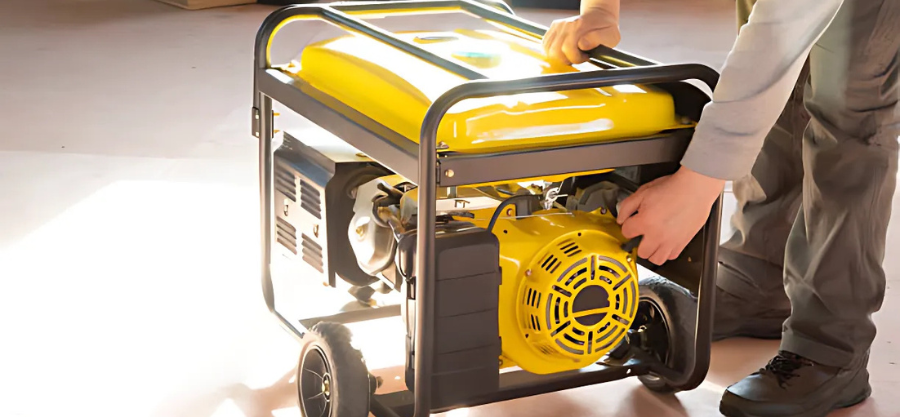Image source: pixabay
When it comes to staying power during outages or while off-grid, a reliable generator can make all the difference.
Jolt Journals brings you the essential guide to understanding, choosing, and maintaining the right generator for your needs.
Understanding Generators
A generator transforms mechanical energy into electrical power, providing electricity when the main grid cannot. Generators come in two main types: portable and standby.
Portable generators are great for short-term use such as camping or emergency home power. Standby generators, on the other hand, are installed permanently and offer a seamless transition during power cuts.
Generators run on various fuel types. Gas and diesel are common, but propane and solar options offer cleaner alternatives. Each fuel type has its benefits and considerations.
Your Go-To Guide for Generators
Choosing a generator starts with understanding your power needs. Calculate the total wattage of the devices you plan to run. Consider whether you need a generator for home use, work, or recreational activities.
Noise is another factor. Generators can be loud, so think about where you will place it.
A good quality generator should be efficient, durable, and easy to maintain. Look for models with good reviews and reliable customer support.
Generator Safety and Maintenance
Safety is crucial when using a generator. Always operate it outdoors to avoid carbon monoxide poisoning.
Keep it dry and do not overload it. Maintenance is also key to a generator's longevity. Regular checks include oil, filter changes, and ensuring the generator is clean.
Common hazards include electrical shocks and fire risks. By following the manufacturer's guidelines and conducting routine maintenance, you can keep these risks at bay.
Generator Accessories and Add-Ons
To improve efficiency, consider additional accessories. A transfer switch, for example, allows a safe connection to your home’s electrical panel. It can be manual or automatic. Weather covers protect your generator from the elements.
Troubleshooting and Common Issues
Even with proper care, generators can encounter problems. Difficulty starting, poor power output, and unusual noises are common issues.
Many of these can be fixed with basic troubleshooting. However, complex problems may require professional help.
The Impact of Climate on Generator Choice
When selecting a generator, considering the climate in which it will operate is crucial.
Generators, like any mechanical equipment, can be sensitive to extreme weather conditions, and their performance and longevity can greatly vary depending on the environment.
- Cold Temperatures: In colder climates, generators may struggle to start and operate efficiently. Look for models designed for low temperatures, which often include features like battery warmers and oil heaters to ensure reliable performance.
- High Humidity: Operating a generator in high humidity or rainy environments requires careful consideration. Excessive moisture can lead to corrosion and electrical issues. Opting for generators with weatherproof housing and moisture-resistant components is wise.
- Salt-Air Environments: Proximity to the ocean can accelerate corrosion due to salt air. In these conditions, selecting a generator with corrosion-resistant coating and stainless steel parts becomes important to enhance durability.
By acknowledging these climate-related challenges and choosing a generator tailored to withstand specific environmental conditions, you can significantly improve the efficiency, reliability, and lifespan of your investment.
Energy Efficiency and Eco-friendly Options
Energy efficiency in generators not only reduces operational costs but also lowers the environmental impact.
Efficient generators use less fuel and produce fewer emissions, which is vital for reducing your carbon footprint.
- Inverter Generators: These models are designed to provide cleaner power and operate more efficiently by adjusting the engine speed to the current power demand, minimizing fuel consumption and reducing emissions.
- Solar-Powered Generators: As a clean alternative, solar generators offer an eco-friendly solution by harnessing renewable energy from the sun. They operate silently, produce no emissions, and can be a cost-effective option over time due to minimal operating costs.
Investing in eco-friendly generators may come with a higher initial cost, but the long-term savings on fuel and maintenance, combined with the benefit of reducing environmental impact, make them a compelling choice for consumers who value sustainability and efficiency.
Installation Process and Considerations
The installation of a standby generator is intricate, requiring adherence to local building codes, obtaining necessary permits, and ensuring a safe, efficient setup.
Start with a professional assessment to determine the correct size and placement, considering noise ordinances and proximity to your home for safety.
- Permits: Securing the correct permits is essential before installation can begin. This process ensures that your generator installation complies with local zoning laws, electrical codes, and safety regulations.
- Professional Assessment: A skilled technician can evaluate your power needs, recommend the appropriate generator size, and identify the optimal installation location. This assessment helps to maximize efficiency and adhere to local codes.
- Safety Codes: Compliance with safety standards, such as the National Electric Code (NEC), is non-negotiable. Installers must ensure proper ventilation, fuel source safety, and electrical connections.
Choosing a reputable installer is crucial. Certified professionals ensure a safe, code-compliant installation, protecting your investment and household.
They can also navigate the permit process and foresee potential issues, providing peace of mind.
Frequently Asked Questions (FAQs)
What size generator do I need for my home/business?
To determine the right size, add up the wattage of all the devices you plan to run simultaneously. Include a buffer for starting watts required by certain appliances.
How often should I perform maintenance on my generator?
Check the manufacturer's guide. Generally, after every use, check oil levels and clean the unit. Conduct a thorough maintenance check annually.
Can I install a generator myself, or do I need professional installation?
Standby generators require professional installation due to their complexity and connection to your home's electrical system. Portable generators are ready to use but follow safety instructions carefully.
How can I reduce the noise from my portable generator?
Consider a generator with noise reduction technology. Placing the generator at a distance, using sound deflectors or enclosures can also help.
What is the difference between peak and rated power in generators?
Peak power refers to the maximum wattage a generator can produce briefly. Rated power is the continuous wattage it can handle.
Conclusion
Generators are invaluable for providing power when needed. By understanding your needs, choosing the right model, and maintaining it properly, you can ensure your generator serves you well for years.
Jolt Journals is committed to offering detailed insights to guide you through selecting, using, and maintaining your generator. To learn more about generators at Jolt Journals, visit our website.
Choosing and maintaining a generator need not be overwhelming. With insights from Jolt Journals, you can make informed decisions and keep your power needs covered. Stay powered, stay informed.
Author's Bio: Sujain Thomas

Sujain Thomas is a freelance content writer and blogger who has written articles for several renowned blogs and websites about Home decor/Diy and various topics to engineer more traffic on websites.She love to decorate home in her free time























